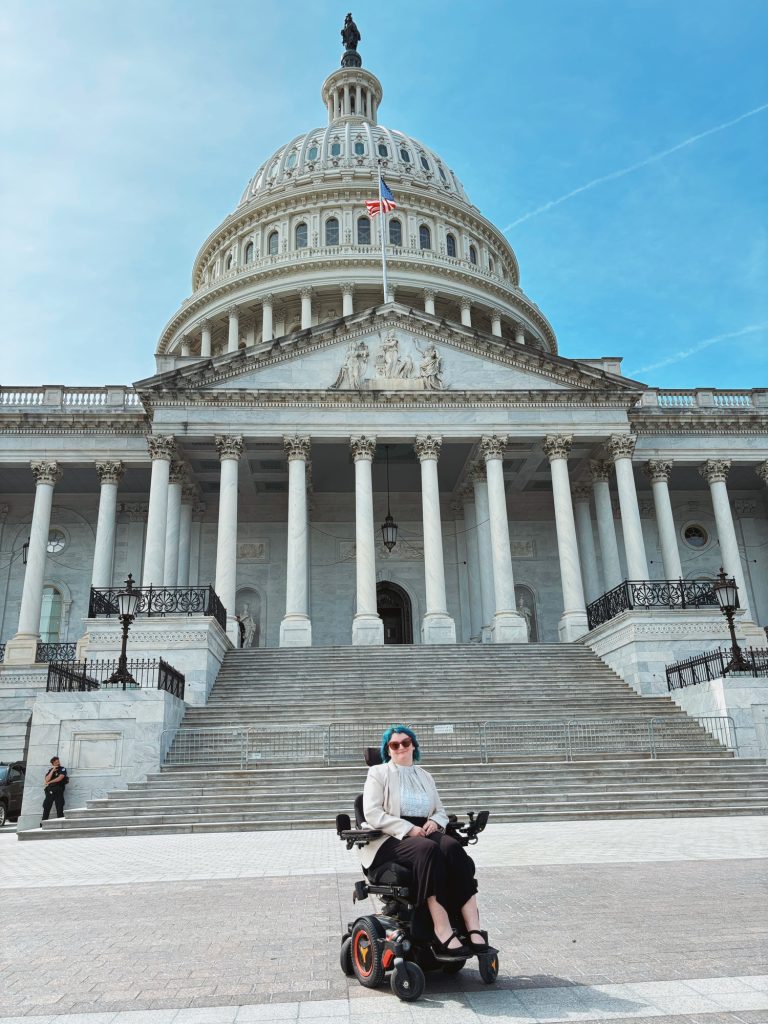Georgie Elson: Championing Advocacy Through Art and Resilience
In a world that often overlooks the voices of those with disabilities, Georgie Elson stands as a beacon of empowerment and advocacy.
Overcoming personal challenges, including a Traumatic Brain injury (TBI) sustained in a long boarding accident, Ehlers-Danlos Syndrome, and Autism, Georgie, who is nonbinary, has transformed their struggles into a passionate commitment to support those in need of home and community-based services. Their journey into advocacy began at a workshop hosted by Disability Rights Ohio (DRO), which ignited their desire to connect with their community, make friends, and learn about navigating complex systems of care.
“Since attending that workshop, I’ve become much more involved in advocacy, attending meetings and learning how to advocate effectively,” Georgie shared. “I’ve made so many new friends along the way, and I feel more connected to my community than ever before.”
At the workshop, participants engaged in various forms of artwork, including poetry—an activity that resonates deeply with Georgie.
“I enjoy writing poetry when I can, but I wish I had more time for my art,” they noted.
Georgie connected with DRO so well that she became a member of the organization’s board in Spring 2024 and serves as the chair of its’ outreach committee.
Currently, Georgie serves as a member of the Ohio Olmstead Task Force, a crucial body of advocates for home and community-based services. They previously co-chaired the Direct Care Workforce Crisis Workgroup, collaborating closely with Education and Advocacy Specialist at the Access Center for Independent Living, Maria Matzik.
“I really enjoyed leading it with Maria and learning from her expertise but decided to pause my efforts with workforce crisis group due to attendance challenges,” Georgie explained. “Moving forward, I am focusing on the legislative committee, which is key to driving meaningful change.”
The importance of advocating for home and community-based services cannot be overstated.
“Everyone is temporarily able-bodied,” Georgie emphasized, pointing out the unpredictable nature of health issues that can impact anyone at any time.
Their own life changed dramatically after their accident, underscoring the importance of accessible services for everyone.
Georgie has testified before legislators on multiple occasions, recounting one of their most significant experiences advocating for increased wages for Direct Service Providers (DSPs) for people with disabilities.
“Other advocates and I spent months compiling data to illustrate how Ohio’s waiver nursing wages compared to surrounding states,” they said. “Seeing our efforts translate into tangible outcomes was incredibly rewarding.”
On one occasion when Georgie was testifying with another advocate about Ohio waiver nursing wages, they stumbled upon a Nurses March at the Statehouse where the two advocates unexpectedly had the chance to share their stories on local news, highlighting the power of grassroots advocacy.
Additionally, Georgie is no stranger to protests, having participated in eleven this year alone. Each event brings its own memorable experiences, whether it be braving frigid temperatures or torrential rain to stand in solidarity with fellow advocates.
“Protesting is cathartic; it’s a way to make our voices heard and demonstrate that we are not alone in our struggles,” they explained. “History shows that sustained protests can lead to significant change.”
Georgie attending the Federal Legislative Advocacy Partnership (FLAP) event in Washington, D.C., this past September was another steppingstone in their advocacy journey. Invited by Disability Rights Ohio, they faced logistical challenges when traveling, including a malfunctioning powerchair and the responsibility of caring for their two German Shepherds, Moona and Sunny. However, their determination led them to lead a meeting with a congressional office—a moment she described as “neat” and indicative of their growing role in federal advocacy.
“Going to D.C. and witnessing the government buildings was memorable, but leading the meeting was a highlight,” they shared.
Marriage equality, particularly in the context of social security benefits for people with disabilities, is another area of advocacy Georgie is passionate about.
“Many don’t understand how the system penalizes individuals with disabilities for getting married,” she explained. “Losing healthcare and financial support shouldn’t be a consequence of choosing love.” Georgie’s deep understanding of the barriers in place fuels their advocacy for systemic change.
As they continue to deepen their involvement in political and federal advocacy, Georgie emphasizes the importance of education.
“Learning about how the federal government functions is crucial,” they emphasized. “Understanding our history and the current landscape helps us shape the future we want to see,” they finished.
Georgie Elson exemplifies the transformative power of advocacy in the face of adversity. Through their commitment to improving the lives of those with disabilities, they not only raise awareness but also inspire others to join the fight for equitable services and rights.
As they eloquently put it, “While change may not happen overnight, the small steps we take together can lead to monumental shifts in our society.”
Georgie’s journey is a testament to resilience and the impact of community, reminding us all the importance of standing together for a more inclusive future.


Wonderful work!